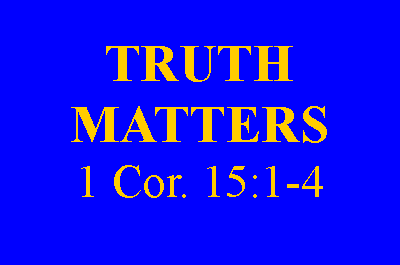


|
I. Introduction.
A. Many people share the opinion of Dr. D. T. Niles, a well known minister of the 1960s. He was lecturer at Yale Divinity School and he preached the first sermon at the first meeting of the World Council of Churches. A man approached him one day, saying, “I don’t believe in the Incarnation, the Atonement, or the Resurrection. I simply believe there is a code of ethics which is the best code for man. I suppose you will say I am not a Christian.” Dr. Niles replied, “No, I just want to ask you a question. If somebody asked you, ‘Are you a Christian?’ what would you say.” “I am a Christian.” “If you say you’re a Christian, you are a Christian. It doesn’t matter what you believe.”
B. Our text gave a simple summary of the gospel which we must believe and to which we must “hold firmly” if we are to be counted among the saved.
1. Notice first that every point he made, Paul established by saying “according to the Scriptures.”
a. This indicates a high concept of the authority of Scripture, which to Paul meant the Old Testament Scriptures.
b. Early on, however, even Paul’s writings came to be regarded as Scripture by the church (as implied in 2 Peter 3:16, where his letters seem to be equated with “the other Scriptures.”)
2. He said the Scriptures concerned “Christ”--giving us our method of interpreting the Scriptures, which must be Christological (centered and focused on Him, for all Scriptures testify of Him.)
3. We must believe that He died for our sins--which implies His deity and the Atonement.
4. We must believe that He was buried and resurrected on the third day.
5. This short summary illustrates how important Truth was to the early church-- and how important it must be to the church today if we are to retain our identity in the cultural chaos we face.
6. Truth Matters!
II. Believing that Truth Matters, however, is more than intellectual acknowledgement of certain facts.
A. “Believe” and “faith” in the New Testament are words from a common root that
1. Vine tell us means “to be persuaded of, to place confidence in, to trust,”
2. Thayer tells us means “to believe . . . To move one by persuasion to do something . . . To obey, yield, comply with.”
3. Truth Matters in that what you believe prompts you to act because you have confidence in it.
a. Rom. 1:5--Paul speaks of “the obedience that comes from faith.”
4. Truth Matters, because what we accept as Truth determines what and whom we obey.
B. The New Testament is emphatic in its stress on the importance of believing the truth.
4. In Romans, Paul speaks of “the truth” as of highest importance:
a. Rom. 1:8--If we “suppress the truth” God’s wrath will fall on us.
b. Rom. 1:24-29--Because men “exchange the truth of God for a lie” they feel free to live lives 1.) of immorality, including every form of sexual impurity and deviance as well as greed and 2.) murder and every form of sin that is so prevalent in our culture.
c. Rom. 2:8--If we reject the truth, we will follow evil and receive God’s anger and wrath.
d. Rom. 16:25-26 (KJV) speaks of “the obedience that comes from faith.”
e. What we believe is what we accept as Truth, it impels us to act the way we do.
5. Consider these other passages:
a. Titus 1:13, 1--Those who “claim to know God but by their actions deny Him” are not “sound in the faith”: they aren’t believers, at all!
b. John 8:31-32,-”To the Jews who had believed him, Jesus said,‘ If you hold to my teaching, you are really my disciples. Then you will know the truth, and the truth will set you free.’”
c. The Truth that Matters is the teaching of Jesus, and it will set us free: 1.) from spiritual oppression 2.) from emotional distress 3.) from physical disease 4.) from bondage of every kind 5.) Truth Matters!
III. Conclusion. There are three elements of Truth that Matters.
A. First is the intellectual.
1. Heb. 11:6, “Anyone who comes to God must believe that He exists and that He rewards those who earnestly seek Him.”
a. That’s the starting point--our minds must be engaged.
b. We must accept as fact His existence or we will not be very anxious to pursue Him.
2. Isa. 1:18, “’Come now, let us reason together,’ says the Lord.”
3. Truth Matters, so it demands the best of our reasoning powers.
B. Truth that Matters also involves the emotional element.
1. Acts 2:37--those unconverted who heard Peter’s sermon on Pentecost were “cut to the heart.”
2. Gal. 5:6--”the only thing that matters is faith [what we believe to be true] expressing itself through love.”
3. Truth will both cut us to the heart and prompt us to love both God and others.
C. Truth that Matters, when accepted, always leads to the third element: obedience.
1. If it has caused us to reason with God and we have been honest with Him,
2. it will cause us to accept with love His demands on us.
3. and this will lead us to obey Him.
4. Heb. 3:18-19 shows the connection between faith and obedience and receiving God’s promise of rest: Those who disobeyed could not enter the promised land of rest because of their unbelief.
5. Louis Berkhof wrote, “Faith is not merely a matter of the intellect, nor of the intellect and the emotions combined; a. It is also a matter of the will, determining the direction of the soul. . . .”
a. We must not be intellectually lazy by refusing to think through the implications of what we believe.
b. We must not be emotional cripples who go to church just to “get high on Jesus.”
c. We must let the Truth as revealed in Scripture so grip us mentally and emotionally that we trust it, that we obey it, that we stake our salvation on it.
|